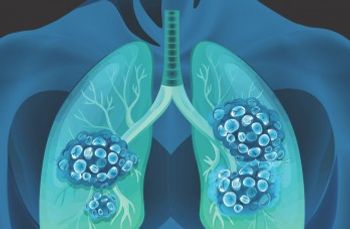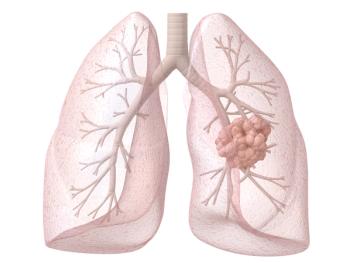
HTMC0435 plus temozolomide led to an ORR of 24.5%, with a median OS of 12.0 months, in patients with platinum-sensitive and platinum-resistant small cell lung cancer.

Your AI-Trained Oncology Knowledge Connection!


HTMC0435 plus temozolomide led to an ORR of 24.5%, with a median OS of 12.0 months, in patients with platinum-sensitive and platinum-resistant small cell lung cancer.

Data from a phase 1 trial showed an ORR of 68% and a DCR of 93% with ZL-1310 in those with extensive-stage small cell lung cancer during dose escalation.

The frequency and severity of adverse effects for the combination were consistent with expected safety findings for each individual agent.

Stephen Liu, MD; and Joshua Sabari, MD, discuss the most intriguing non–small cell lung cancer and small cell lung cancer breakthroughs from the meeting.

Sacituzumab tirumotecan showed a manageable safety profile compared to docetaxel in patients with EGFR-mutant advanced non–small cell lung cancer.

Among 44 patients with EGFR-positive non–small cell lung cancer who discontinued docetaxel, 36.4% crossed over to the sac-TMT arm.

THIO with cemiplimab is active and well-tolerated in patients with advanced non–small cell lung cancer resistant to immune checkpoint inhibitors in second- and third-line settings.

Data from DeLLphi-304 support tarlatamab as a preferable second-line therapy for patients with small cell lung cancer.

RET rechallenge following disease progression demonstrated greater efficacy with select combination therapies targeting bypass resistance vs single agents.

Results from CheckMate-816 could be practice-changing after an OS improvement was noted with NAT nivolumab plus chemotherapy in resectable NSCLC.

Benmelstobart-based regimens provide clinically meaningful PFS benefits as consolidation therapy for unresectable stage III non–small cell lung cancer.

Efficacy and biomarker analyses from CheckMate-77T support perioperative nivolumab as an effective option in resectable NSCLC.

An efficacy advantage with osimertinib-containing regimens was consistent across predefined patient subgroups in those with EGFR-mutant NSCLC.

Most patients who received COCOON dermatologic management reported mild or no dermatologic symptoms following treatment with amivantamab/lazertinib.

Safety and efficacy were noted with LB2102 for patients with small cell lung cancer and large cell neuroendocrine carcinoma.

Neoadjuvant alectinib met the primary end point with a major pathologic response rate of 42% in patients with potentially resectable stage III NSCLC.

Data from SACHI support savolitinib/osimertinib as a chemotherapy-free option in previously treated EGFR-mutated NSCLC harboring a MET amplification.

Results from HERTHENA-Lung02 did not show improved OS with HER3-DXd for patients with EGFR-mutated NSCLC.

Among 2 patient subgroups with advanced, HER2-mutant non–small cell lung cancer, sevabertinib showed comparable objective response rates.

Results from the KRYSTAL-7 trial showed that efficacy was improved with adagrasib/pembrolizumab for KRAS G12C-mutated NSCLC.

Amivantamab/chemotherapy remained efficacious regardless of the osimertinib resistance mechanism for patients with EGFR-mutated NSCLC.

BL-B01D1 may produce promising antitumor activity in a heavily pretreated population of patients with EGFR-mutated non–small cell lung cancer, according to an expert at University Cancer Center in Guangzhou, China.

Sotorasib maintains a progression-free survival benefit compared with docetaxel in the treatment of patients with KRAS G12C-mutated non–small cell lung cancer in the phase 3 CodeBreaK 200 trial.

The results of the phase 3 LUNAR trial evaluating tumor treating fields plus standard-of-care therapies among patients with metastatic non–small cell lung cancer are “encouraging,” according to an expert from Winship Cancer Institute of Emory University.

Adding pembrolizumab to chemotherapy shows little increase in adverse effects among patients with metastatic nonsquamous non–small cell lung cancer in the phase 3 KEYNOTE-789 trial.

Sunvozertinib shows a similar safety profile to other EGFR tyrosine kinase inhibitors in the treatment of EGFR wild-type non–small cell lung cancer in the WO-KONH6 study.

Datopotamab deruxtecan plus pembrolizumab produces no new safety signals in the treatment of patients with advanced non–small cell lung cancer in the phase 1b TROPION-Lung02 trial.

Investigators report no deaths related to treatment with ABBV-011 among patients with small cell lung cancer in a first-in-human phase 1 trial.

Nivolumab plus ipilimumab and chemotherapy also appears to produce a higher overall response rate compared with chemotherapy alone among those with squamous non–small cell lung cancer in the phase 3 CheckMate 9LA trial.

Patients who receive nivolumab plus chemotherapy for non–small cell lung cancer may experience sustained improvement in time to death or distant metastasis, according to an expert from McGill University Health Center.